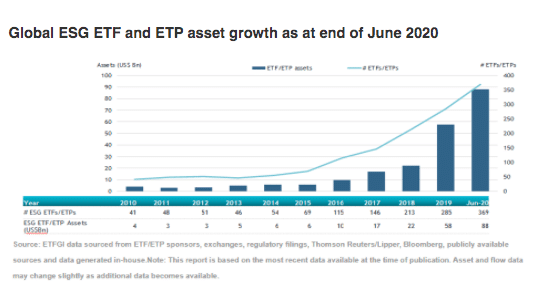More than half of institutional investors, 55%, believe the majority of their environmental, social and governance investments will be in passive products within the next five years, according to research from asset manager Invesco.
Institutional investors currently hold a fifth of their ESG exposure in passive vehicles such as exchange-trades funds, and nearly half intend to increase their passive holdings over the next two years.

Gary Buxton, head of EMEA ETFs and indexed strategies at Invesco, said in a statement: “Investors are often first attracted to ETFs due to their low costs and simplicity, but as we have seen so far this year, ESG ETFs have also been able to deliver on performance objectives.”
More than half of the institutional investors in the survey also believe that ETFs with ESG considerations have the potential for enhanced performance. The survey said only 4% think ESG ETFs would not be able to outperform, while 36% believe there is no connection between ESG and relative performance.
The research also found that 68% of respondents think the COVID-19 pandemic will accelerate the development and take up of ESG investments over the next two years.
Invesco launched the the first sterling corporate bond ETF in Europe that incorporates ESG criteria and in March it listed an ETF which tracks the S&P 500 but improves the index’s ESG profile.
Detlef Glow, head of EMEA research at Lipper, said in a report last month that the industry may be reaching the breaking point where the majority of assets are managed with a sustainability-based approach, rather than in a conventional way, within the next five years.
ESG and ETFs – Two hot topics in the financial industry. Read more about the expectations on these trends in @DetlefGlow's latest Monday Morning Memo: https://t.co/ZH2Y8Va1wf #MondayMM pic.twitter.com/njFaPpZ9y6
— Lipper Leaders – Refinitiv (@LipperLeaders) July 7, 2020
“Since the ETF industry is quite fast in translating investor trends into products, it is not surprising that we have seen a constant stream of new ESG-related products within this product segment,” he added.
He cited the TrackInsight ETF Professional Investors Survey 2020 which found that ESG was the top priority when professional investors were asked which products they would like to see from ETF promoters.
Glow added: “86% of the recipients of the TrackInsight survey want to increase their exposure to ESG ETFs.”
The investors also wanted ESG exposure in more asset classes such as emerging markets and high-yield bonds.

“The demand for more solutions in the area of emerging markets and high-yield bonds is not surprising since bonds are way harder to evaluate from an ESG perspective than equities,” said Glow. “ This is especially true for more exotic markets, as these markets face in general a lack of transparency compared to developed markets.”
As a result he expects the launch of indices covering more exotic markets. However investors also found the lack of transparency and simplicity of ESG indices’ methodologies as the main challenges when investing in ESG ETFs.
“From my point of view, this means that the ETF and index promoters will have to increase their educational efforts and have to work on their communication strategies, as clarity on the criteria used to construct the respective index will be key for the success of the related products,” said Glow.
Net inflows
ESG ETFs listed globally gathered net inflows of $32bn (€27bn) in the first half of this year, more than triple the $9.9bn gathered at the same time in 2019 according to ETFGI, an independent research and consultancy firm covering trends in the global ETFs/ETPs ecosystem. Assets invested in ESG ETFs and ETPs reached a record $88bn a new record at the end of June.

Products domiciled in Europe accounted for half of the overall ESG assets, followed by the US with 40.5% and Asia Pacific ex Japan with 5.8% of the assets.
ETFGI said that since the launch of the first ESG ETF/ETP in 2002, the number and diversity of products have increased steadily to 369, with 1,019 listings from 89 providers on 31 exchanges in 25 countries. During June, 21 new ESG ETFs/ETPs were launched.
iShares
The first ESG ETF/ETP was launched by iShares, now owned by BlackRock. Last month BlackRock said it had record flows of $11bn into U.S. iShares sustainable ETFs in the first half of this year, more than doubling the previous mark of $5bn for all of 2019.

Armando Senra, head of iShares Americas, said in a statement: “Though the recent pandemic has increased interest in companies with an ability to better manage sustainability-related risk – in particular, the ‘S’ or social issues of ESG – asset flows into U.S. sustainable ETFs have been on a multi-year upward journey. Since 2018, annual industry flows have grown more than 500%, from $2.5bn to $14bn year to date.”
He continued that iShares had launched 23 new sustainable ETFs this year across the U.S., Europe and Canada.
